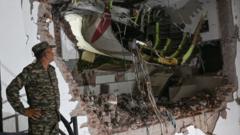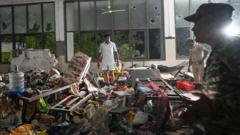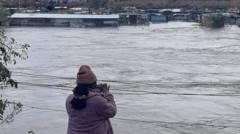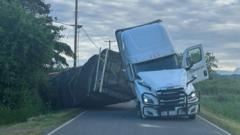A 27-year-old Chinese university student living in Japan faced rescue operations twice in mere days after he attempted to climb Mount Fuji outside the official climbing season and went back for his mobile phone. The student first became stranded on the Fujinomiya trail, situated around 3,000 meters (9,800 feet) above sea level, after losing his crampons, which are vital for grip and safety on the challenging terrain. He was airlifted to safety by helicopter on Tuesday.
Mount Fuji Climber Rescued Twice After Retrieving Lost Phone

Mount Fuji Climber Rescued Twice After Retrieving Lost Phone
A Chinese student ignores safety advisories, causing two rescues in four days.
Following his initial rescue, the student made the controversial decision to return to the mountain in search of belongings he had abandoned, including his phone. On Saturday, he was rescued again after experiencing altitude sickness but is now reported to be out of danger.
Authorities strongly discourage climbing Mount Fuji outside the designated climbing window from July to September, warning that off-season conditions can be severe and unpredictable, complicating rescue efforts. All summit trails are closed during this period, and medical facilities along the routes are also non-operational.
In response to the rescues, police in Shizuoka prefecture emphasized the dangers of winter climbing and expressed disapproval towards the climber's disregard for official advice. Some social media commentators criticized the student, suggesting he should bear the costs of both rescue missions due to his reckless choice. Mount Fuji, a world-renowned symbol of Japan, welcomes more than 220,000 climbers annually during the official climbing season, as authorities have begun taking measures to manage increasing tourist traffic effectively.
Authorities strongly discourage climbing Mount Fuji outside the designated climbing window from July to September, warning that off-season conditions can be severe and unpredictable, complicating rescue efforts. All summit trails are closed during this period, and medical facilities along the routes are also non-operational.
In response to the rescues, police in Shizuoka prefecture emphasized the dangers of winter climbing and expressed disapproval towards the climber's disregard for official advice. Some social media commentators criticized the student, suggesting he should bear the costs of both rescue missions due to his reckless choice. Mount Fuji, a world-renowned symbol of Japan, welcomes more than 220,000 climbers annually during the official climbing season, as authorities have begun taking measures to manage increasing tourist traffic effectively.























